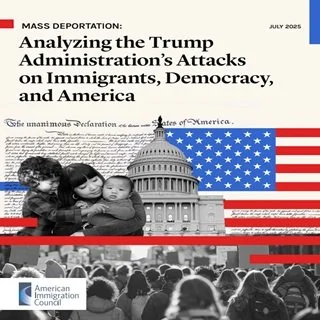By The American Immigration Council
The first six months of the second Donald J. Trump administration have arguably seen the most significant changes to U.S. immigration policy in the nation’s history. Taken one by one, as they have been announced or revealed, the effect can be overwhelming: it seems impossible to even comprehend everything that has happened, much less to understand it in a systematic way or to anticipate what might come next. The purpose of this report is not to recapitulate the last six months of chronology. Nor is it to contextualize the last six months within the history of immigration policy. The administration is simultaneously continuing some policy trends in place under the previous administration; taking latent powers within immigration law and using them as a matter of course; reanimating laws whose enactment predates the modern immigration system; and asserting wholly new powers that have never existed in law before. Lists like these can make anyone feel as though they have no idea what is actually going on. We aim to do the opposite of that: to provide a framework for the American people to understand what has been done to noncitizens, the communities in which they live, and the entire U.S. immigration system since January 20, 2025. We hope this framework will remain useful as the Trump administration continues its effort to fundamentally transform the American government, character, and role in the world. Our report is organized as a survey of the immigration policy landscape as of mid-2025, seeking to answer three key questions: The first six months of the second Donald J. Trump administration have arguably seen the most significant changes to U.S. immigration policy in the nation’s history. Taken one by one, as they have been announced or revealed, the effect can be overwhelming: it seems impossible to even comprehend everything that has happened, much less to understand it in a systematic way or to anticipate what might come next. The purpose of this report is not to recapitulate the last six months of chronology. Nor is it to contextualize the last six months within the history of immigration policy. The administration is simultaneously continuing some policy trends in place under the previous administration; taking latent powers within immigration law and using them as a matter of course; reanimating laws whose enactment predates the modern immigration system; and asserting wholly new powers that have never existed in law before. Lists like these can make anyone feel as though they have no idea what is actually going on. We aim to do the opposite of that: to provide a framework for the American people to understand what has been done to noncitizens, the communities in which they live, and the entire U.S. immigration system since January 20, 2025. We hope this framework will remain useful as the Trump administration continues its effort to fundamentally transform the American government, character, and role in the world. Our report is organized as a survey of the immigration policy landscape as of mid-2025, seeking to answer three key questions.
Washington, DC: American Immigration Council, 2025. 74p.






